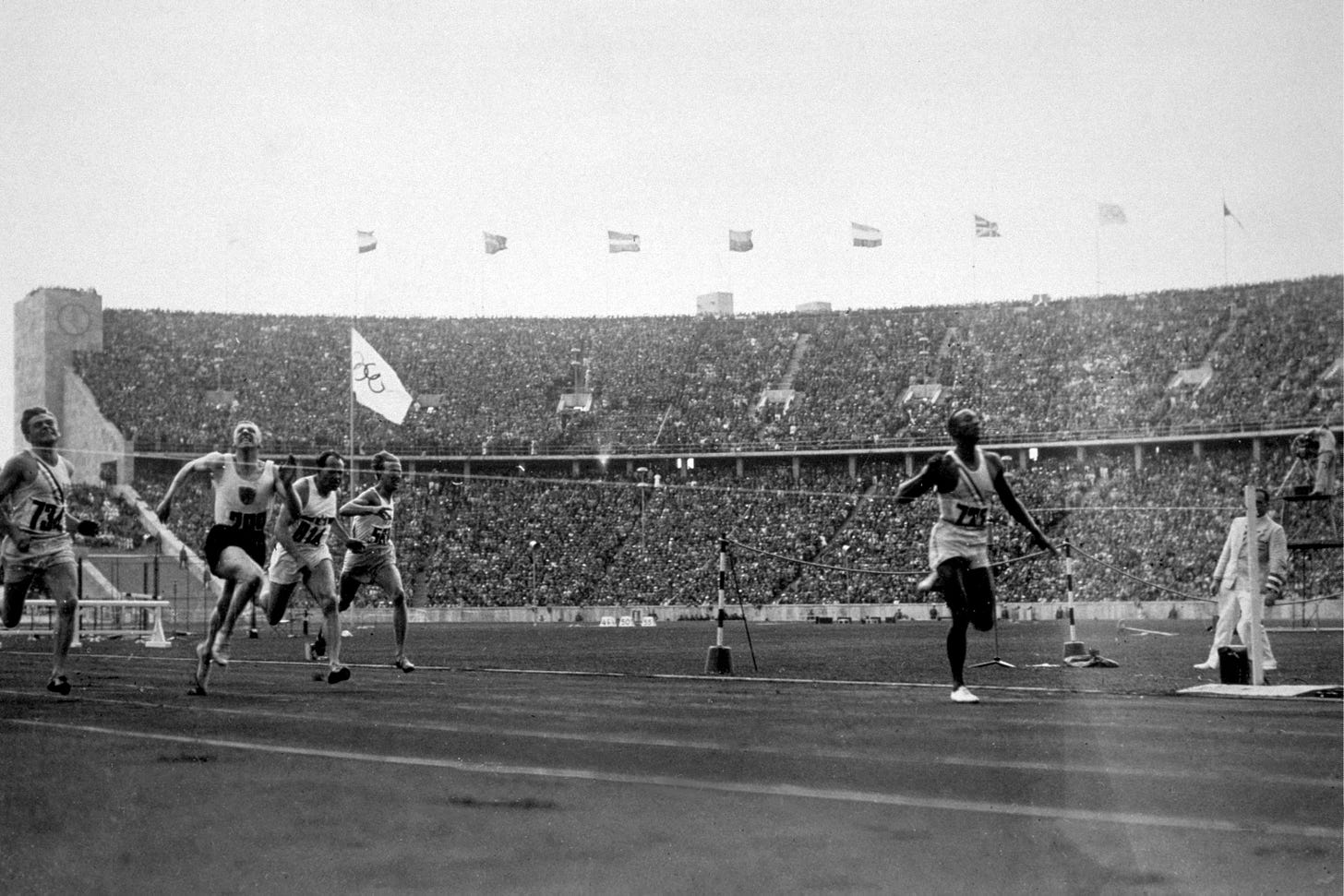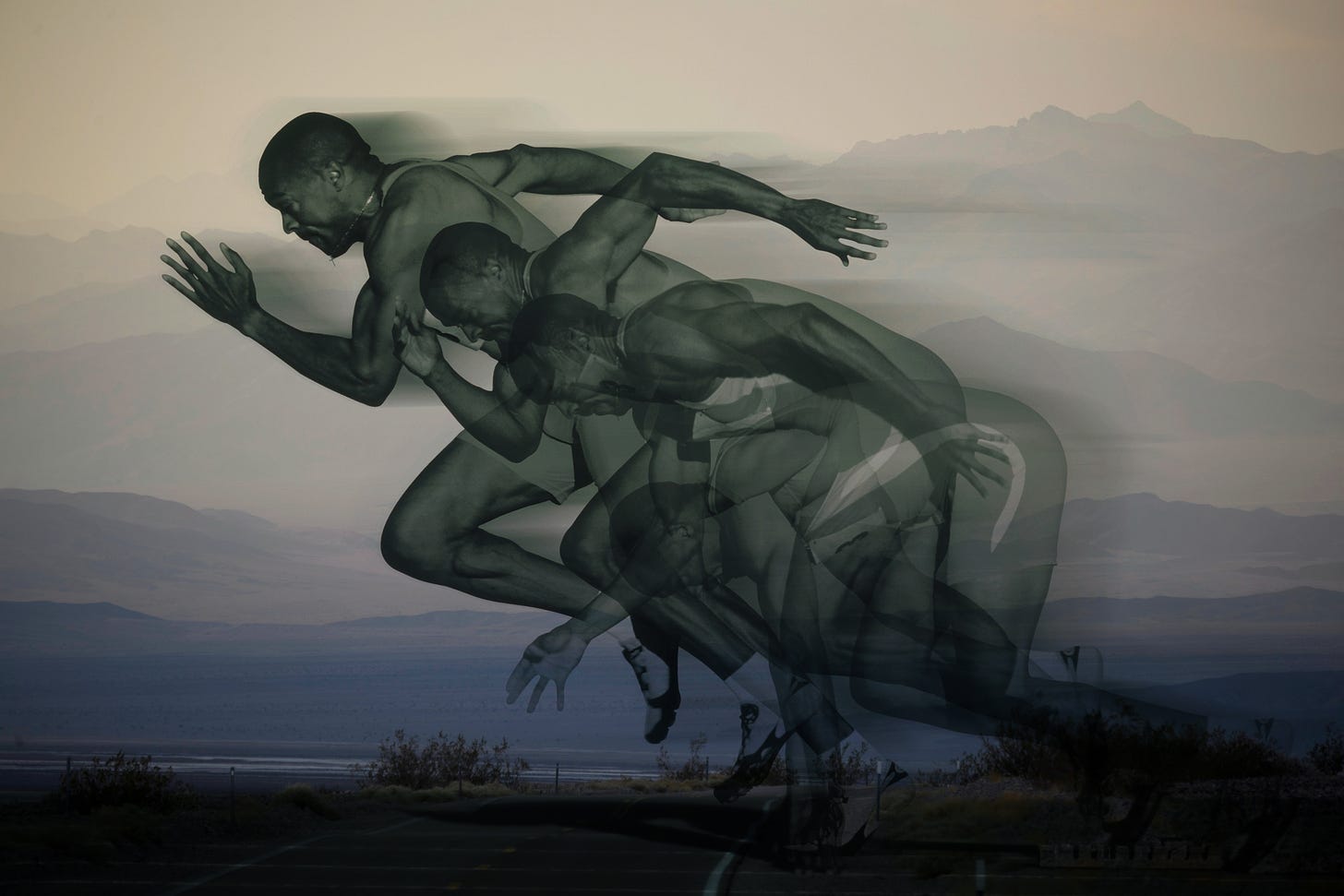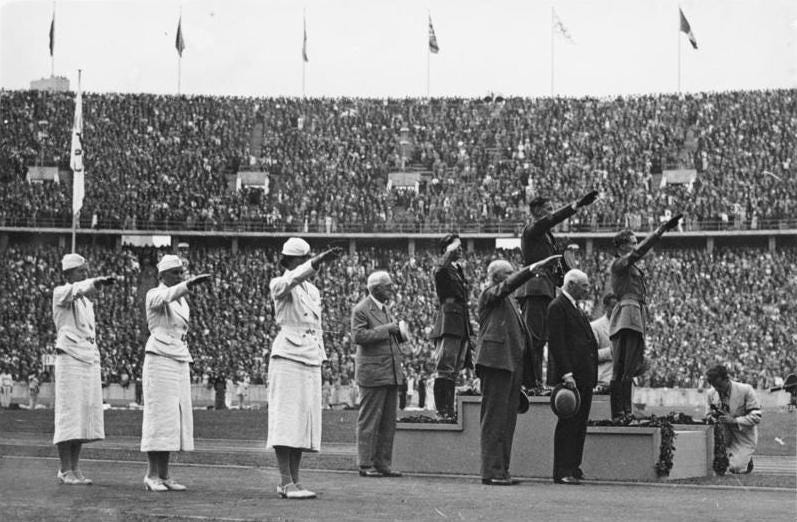1. The Buckeye Bullet and Aftershocks of Hate
So far, this newsletter has ragged on a number of American pastimes that hinder the experience of running—prioritizing automobiles, hating women, etc. But if there is one American tradition that’s been slipping lately that I think we should resurrect, it’s humiliating Nazis. And who better to look to as a model of excellence for that ambition on the last day of the Olympics and during Black History Month than Jesse Owens.
In the 1936 Berlin Olympics, Hitler wanted to show the world his vision of Aryan supremacy—
—and then America showed up and told him to get wrecked as Black athletes won gold after gold after gold.

Despite the passage of nearly 90 years and these historic victories abroad, for which these Black athletes ought to be celebrated as heroes and icons of the American spirit of freedom and triumph over discrimination—today, Black Americans still face harassment and racial profiling while running at home in their own neighborhoods.
In January, the three men who chased and shot to death unarmed 25-year-old Ahmaud Arbery while he was jogging, were sentenced to life in prison. This week, their case is back in court—this time on federal hate crimes charges—and the prosecution has brought forth a mountain of evidence showcasing the defendants’ history of animosity toward people of color.
The high-profile nature of the case has brought attention to the added stress and persecution Black people face when running. Similar to the survey results released by Runner’s World on “Running While Female,” following the Arbery case the New York Times asked its readers to share their experiences “Running While Black.”
Even in my own neighborhood, I fear. I think about how Trayvon Martin was in his own gated neighborhood when he was followed and gunned down. When it starts to rain a little bit, as it did the night Trayvon was killed, I cut my run short because of what happened to him. I think, They won’t believe I’m just trying to run in the rain.
— Marren Ellis, Montgomery, Ala.
The responses are a capsule of anxiety not just of running while Black, but also the early stage of the pandemic.
2. Looking for Values-Driven Solutions
This week Coach Fitts was interviewed by District Fray about our team:
Currently in its third year, GRIT is so much more than a triathlon team. . . . At its core, though, is a critical mission: to enact socio-cultural change. GRIT seeks to challenge governing bodies of sport, increase the multi-sport enrollment of People of Color, inspire communities, and bridge the performance gap for athletes. You won’t see the word diversity here, because as Fitts points out, “Anyone can come together to showcase diversity. Inclusion is ‘how do we make [tri]suits that fit you?’”
In other words, being action-oriented. . . .
In the last couple of years, Fitts and Team GRIT have received accolades for their work and commitment to an inclusive multi sport experience. Almost a year ago, his team was featured on the cover of Triathlete Magazine. In a sport and media landscape synonymous with racial homogeneity, this milestone might represent change to come.
But, Fitts tells me “conversations around why representation matters have gotten worse,” as he recalls a thread last year on Triathlete Magazine’s Facebook Page that was overwhelmed with racist comments in response to an article about GRIT USA and the work they’re doing to amplify minority voices in sport.
“It always comes up, anytime Black, Brown, or Asian voices are elevated, the backlash is always about not understanding why it needs to be about color or race.”
This type of negating response always reminds me of a footnote in Christopher Hitchens’s memoir about how the class system persists in America:
The same is true for racism and the lack of racial equality or equity in America. There is a collective denial of reality among some white Americans who would rather ignore or place blame elsewhere for the state of society than confront the ways privilege works in their favor and advantage. You can’t start to fix and address a problem if the agents most in need of change won’t recognize or acknowledge the problem in the first place.
3. Extras!
Another favorite Hitchens quote is from his take on the Proust Questionnaire:
I think we the people should rise up and demand Tracksmith re-release their sold-out line celebrating the New York Pioneer Club—products aside, they also do great storytelling and photography. For this collection they shared some of the history of Black running clubs in New York:
Ted Corbitt has been hailed as the “spiritual elder of the modern running clan” and the father of long-distance running. The first Black athlete to compete in the Olympic Marathon for the United States, he was the co-founder and president of the New York Road Runners and instrumental in creating the course measurement standards we rely on today. A member of the New York Pioneer Club and an acclaimed physical therapist, Corbitt completed four 300-mile training weeks while working full time, averaging 44.6 miles a day, and set several American records. His consistency and longevity were astounding, running over 1000 miles in one month at age 50 and walking 300 miles in six days at age 82. . . .
Founded in 1936 in Harlem, NY by three Black Athletes—Joseph J. Yancey, Robert Douglas and William Culbreath—the Pioneer Club’s mission was “to support, encourage, and advance athletics among youth of the New York Metropolitan district, regardless of Race, Color or Creed. To encourage and further the ambition of our youth for higher education that they might become intelligent, civic-minded citizens, and to work toward a better racial understanding through the medium of education and sports.” Ted Corbitt became a member of the nation’s first integrated running club in 1947.
This week was also the 44th anniversary of the first Ironman triathlon race! Read its origin story and resulting legal battles.
There is a Jesse Owens biography featured on the reading list you should check out!









To say that there are people who is racist is one thing, to say it is systemic is another. You are not clear about that. Furthermore, to pick a few cases lead to bias, not to truth. What I notice, and I believe is not your case, is that people that speaks more about racism are themselves the most racist ones, reflecting that in others and alleviating their consciences.
A 300 mile training week while working full time?! Just thinking about it makes me tired!